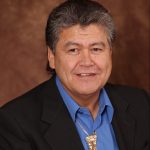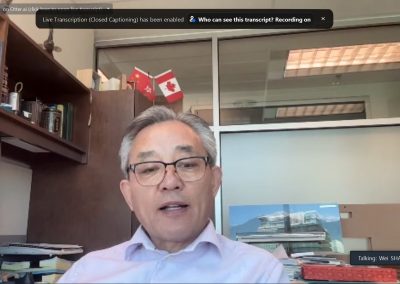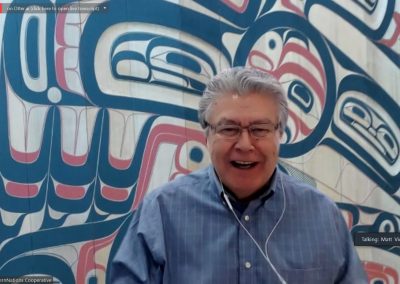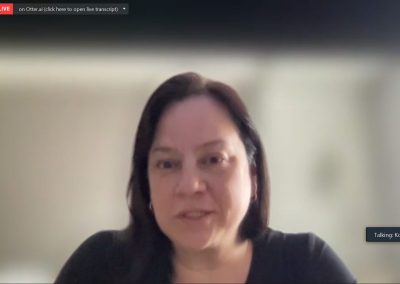Report Launch Webinar: Preparing Indigenous Groups to take on the China Market
Report Launch Webinar: Preparing Indigenous Groups to take on the China Market
The potential for economic activity between China and Canadian Indigenous businesses and communities is immense. China is the world’s second largest economy, the world’s largest exporting nation, and is Canada’s second largest trading partner. It has a large, growing middle class with an increasing demand for energy, natural resources, tourism, agri-food (including seafood), and outputs from other industries which Canada, and Canada’s Indigenous peoples, have in large supply. China also is a natural source of capital investment for Indigenous communities that need infrastructure to increase their supply of these outputs.
However, this has so far been a largely untapped opportunity. Only 17% of Indigenous businesses have clients in markets outside of Canada and the United States, and there have only been a limited number of successful business interactions between Chinese companies and Indigenous businesses and communities. How can stakeholders best seize this opportunity moving forward?
On Thursday, March 31, CCBC, in collaboration with Dentons Canada LLP, released key findings and insights of Preparing Indigenous Communities to Take On the China Market in an interactive webinar discussion. The new report, which outlines opportunities (and challenges) surrounding the Indigenous-China business relationship in 2022, aims to provide Indigenous firms/communities with a roadmap for China market success.
Access the English report here; access the French report here.
Attendees learned proven best practices for how Indigenous entrepreneurs and Indigenous-owned companies and organizations can initiate and strengthen business ties with China, and hear Indigenous success stories. Registration was free for all attendees. Simultaneous French interpretation was available for the live session.
Sponsor:

CCBC thanks CanExport Associations for partial funding support for this program.
The link to the video presentation is available upon request. Please contact your regional Chapter Director to request access:
• Atlantic: Edward Dai
• Quebec: Philippe Jeanneau
• Ontario: Jeff Zhang
• Prairies: Philippe Jeanneau
• BC: Philippe Jeanneau
• Beijing: Noah Fraser
• Shanghai: Edward Dai
About the speakers:

Wei SHAO
Partner
Dentons
Wei SHAO is the National Practice Group Co-Leader for China and specializes in international business transactions focusing on China. He has extensive experience in mergers and acquisitions, corporate and project financing, cross-border counseling, and general corporate and commercial transactions.
Wei has represented Chinese investors and entrepreneurs, sovereign and investment funds, private and public companies as well as major SOEs in various significant transactions in Canada, especially in natural resource and mining. Wei has also advised Canadian and international companies in natural resources, manufacturing, high-tech, environment, infrastructure and financial transactions in China. He has also provided legal advice to government agencies and diplomatic missions from both Canada and China. He is a frequent speaker at various conferences on matters related to investment in or from China.
Prior to his legal career Wei worked for the United Nations in New York. Wei is an interpreter accredited by the United Nations and by the federal government of Canada. As an interpreter or consultant, Wei has been involved in numerous ministerial and prime ministerial meetings or negotiations between Canada and China.

Matt Vickers, CET
Director & Chief Executive Officer
NorthernNations Cooperative (NNC)
Matt Vickers has been entrenched in his tradition and a top-notch business leader for the past 44 years. He has been honoured for his performance in business and his passion of supporting others in valuing diversity in the workplace. Focused on niche market delivery, client attention and retention, governance, and a determination for success, he has built several successful businesses in a variety of sectors including First Nations artwork, technology, and management consulting. He has worked with Royal Bank Financial Group as a Senior Manager developing their Aboriginal Banking program. Matt left his position as the Provincial Director of Aboriginal Services and a Partner with Meyers Norris Penny in June of 2009. Matt is now a Partner & CEO of Generating for 7 Generations ($27 billion rail project) and owner of Vickers & Associates, a management and financial consultancy. Matt recently took on the additional position of Director and CEO for NorthernNations Cooperative.
Vickers’ commitment to creating an enduring legacy that will educate and impact the world is surpassed only by his commitment to his family; he is the proud father of six children Matthew, Aliah, Faith, Joshua, Shivan & Alan and three grandchildren Taylor, Violet, and Elaina. Matt currently resides in Sechelt B.C. with his beautiful wife Paiman. Matt’s ancestry is Heiltsuk (Grandfather’s side), Tsimshian (Grandmother’s side), Haida (Great Grandfather’s side) and English on his mother’s side.

Kory Wilson, Kwakwaka’wakw
Executive Director, Indigenous Initiatives and Partnerships
British Columbia Institute of Technology
Kory is Executive Director of Indigenous Initiatives and Partnerships at BCIT, as well as a lawyer, Kwakwaka’wakw, writer, speaker and educator. Kory has designed and taught many innovative programs and courses such as Langara College’s Haida Gwaii Field School and Aboriginal Studies program and SFU’s Good Governance, Moving Beyond the Indian Act course, among many others. She was instrumental in the creation of six open-sourced BC Campus Indigenization Guides and recently created and launched the BCIT Indigenous Vision. Kory, a sought after advocate for Reconciliation, assists BCIT in Indigenous awareness training, cultural activities, policy reviews, hiring and student support. Kory serves on more than 10 non-profit boards and as a founding member of UBC’s President’s Advisory Committee, has been involved in two UBC Indigenous Strategic Plans.




